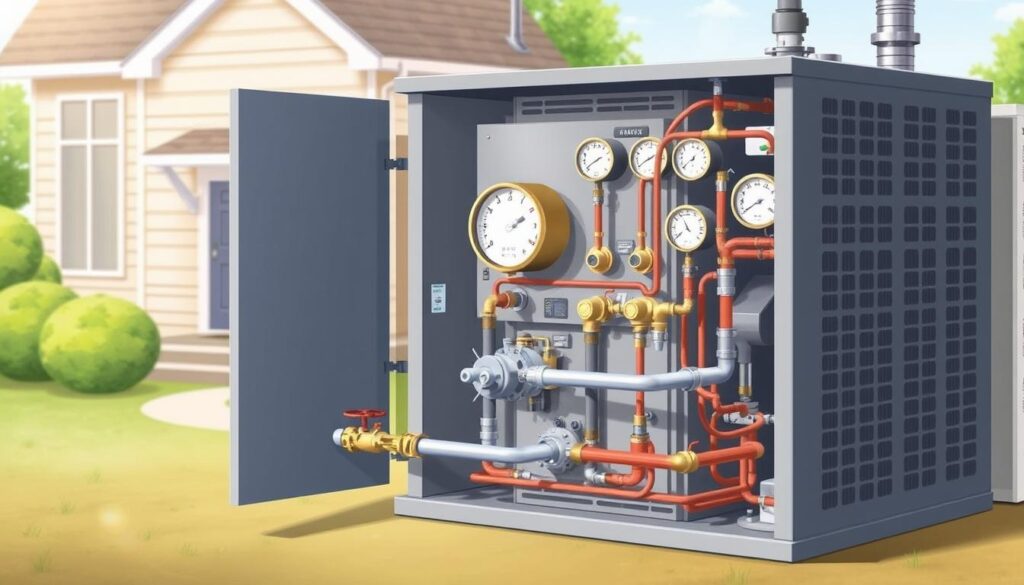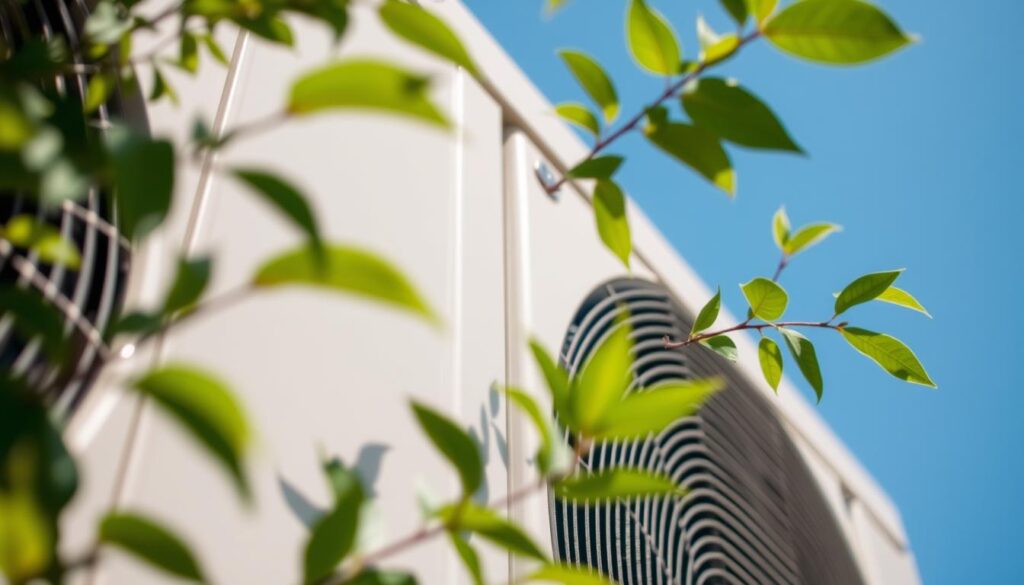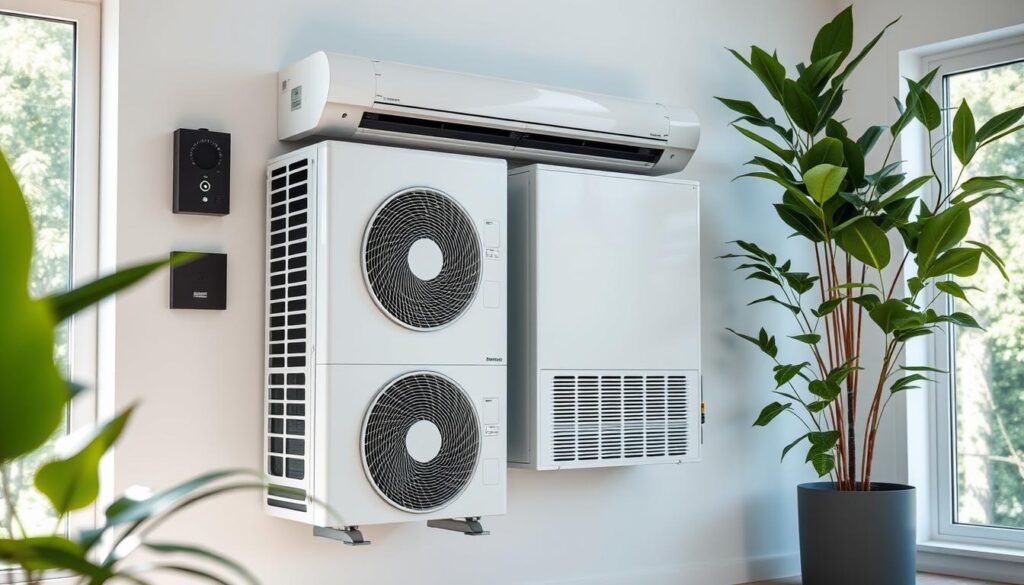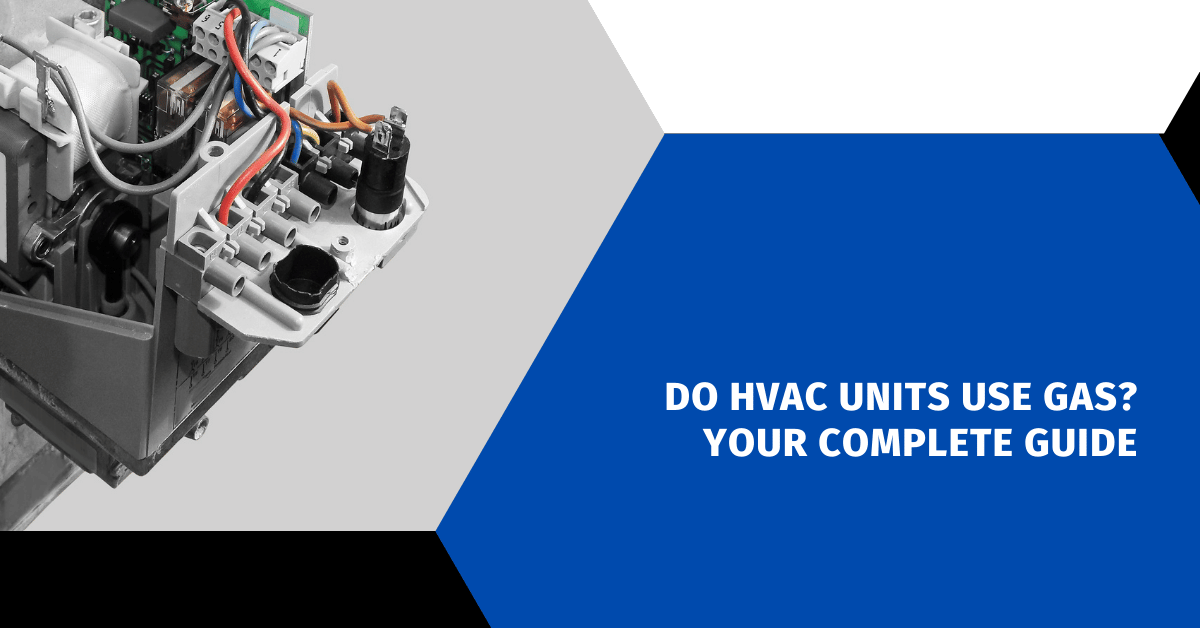Affiliate Disclosure
HVAC Guide Guys is a participant in the Amazon Services LLC Associates Program, an affiliate advertising program designed to provide a means for sites to earn advertising fees by advertising and linking to Amazon.
Do HVAC Units Use Gas? About 8.5 million American homes use heating oil in winter. This shows how many ways we heat and cool our homes. Knowing how HVAC systems work can help you choose the best for your home’s comfort and energy use.

Key Takeaways
- Most HVAC systems use electricity, not gas, to work.
- Air conditioners cool by changing a refrigerant’s state to move heat.
- HVAC systems can run on electricity, natural gas, propane, or heating oil. Each has its own benefits and downsides.
- Choosing between gas or electric HVAC depends on natural gas availability, environmental impact, costs, and upkeep.
- Learning about HVAC parts and how they work can guide your choices. It helps keep your home comfortable all year.
Table of Contents
Understanding HVAC Systems and Their Power Sources
HVAC systems keep our homes comfortable. They have parts like thermostats, furnaces, and air filters. These systems run on electricity, gas, propane, or oil.
Basic Components of HVAC Systems
The thermostat controls the temperature. Furnaces or boilers heat the air using gas, oil, or electricity. Air conditioners cool the air with electricity.
Different Types of HVAC Power Sources
- Electricity: This is the most common power source for HVAC systems.
- Natural Gas: It’s used for heating and is efficient and cost-effective.
- Propane: Like natural gas, it’s used for heating.
- Heating Oil: It’s used in older furnaces but is less common now.
The Role of Energy in HVAC Operation
Energy efficiency is key in HVAC systems. Modern units have high AFUE and SEER ratings. These ratings help choose energy-efficient hvac units that save money and energy.
Choosing between gas vs electric hvac systems is important. It depends on energy efficiency, cost, and environmental impact. Knowing about HVAC systems helps make smart choices for comfort and energy savings.
Explore Our HVAC Shop
Looking for top-rated HVAC tools, parts, and accessories? Visit our shop and find the perfect solution for your needs.
Visit the ShopDo HVAC Units Use Gas?
Many people wonder if HVAC systems use gas. Most air conditioners run on electricity. But, some HVAC systems use gas for heating.
Central air systems often use a gas furnace for heat. The air conditioning part runs on electricity. This setup works well for both hot and cold weather.
Natural gas air conditioners were once common but are now less popular. Today, gas is mainly used in heating systems like furnaces. These can run on natural gas or propane.
The energy needs of HVAC systems vary. They depend on the climate, home size, and equipment efficiency. Sometimes, a mix of gas and electric is used for better energy use and cost.
Thinking about gas in HVAC systems has its pros and cons. Gas systems might heat better but cost more to install and keep up. The choice between gas or electric depends on what the homeowner needs and wants.
How Air Conditioning Systems Work
Air conditioning systems keep your home cool, especially when it’s hot and humid. They use a refrigeration cycle to cool the air. Knowing how they work helps you choose the right hvac gas consumption and energy efficient hvac units for your home.
The Refrigeration Cycle
The refrigeration cycle is at the core of air conditioning systems. It moves a refrigerant, which changes from liquid to gas. This process cools the air inside your home.
Components and Their Functions
- Compressor: This part makes the refrigerant hot by pressurizing it.
- Condenser: It cools the refrigerant down by releasing heat outside.
- Expansion valve: This valve lowers the refrigerant’s pressure, cooling it further.
- Evaporator: It cools the air inside by absorbing heat from the refrigerant.
Role of Refrigerant in Cooling
The refrigerant is key to cooling your home. It changes from liquid to gas as it moves through the system. This change helps move heat from inside to outside, keeping your home cool.
“Understanding how air conditioners work can help homeowners run the system more effectively, handle small problems, lower energy bills, and make informed purchasing decisions.”
Types of HVAC Fuel Sources
There are many ways to power your HVAC system. You can choose from electricity, natural gas, propane (LPG), or heating oil. Knowing the good and bad of each can help you decide what’s best for your place.
Electricity is great for air conditioners and heat pumps. It’s clean and efficient. Natural gas is common for heating, especially where gas lines are available. Propane is an option when natural gas isn’t an option.
Heating oil is more common in the northeastern U.S. It powers some furnaces and boilers. Each fuel has its own benefits, like cost, efficiency, and how it affects the environment. So, your choice depends on what’s available, the weather, and what you prefer.
| Fuel Type | Efficiency | Cost | Environmental Impact |
|---|---|---|---|
| Electricity | High | Varies | Depends on power generation source |
| Natural Gas | High | Moderate | Lower emissions than other fossil fuels |
| Propane (LPG) | High | Moderate | Lower emissions than heating oil |
| Heating Oil | Moderate | Higher | Higher emissions than natural gas or propane |
Choosing the right fuel for your HVAC system depends on many things. Homeowners should think about their needs and what they like. This will help them pick the best fuel for their home or business.
Explore Our HVAC Shop
Looking for top-rated HVAC tools, parts, and accessories? Visit our shop and find the perfect solution for your needs.
Visit the ShopGas vs Electric HVAC Systems: A Detailed Comparison
Choosing an HVAC system for your home is a big decision. You have to weigh the pros and cons of gas and electric systems. Knowing the differences helps you pick the best option for your needs and preferences.
Energy Efficiency Differences
Energy efficiency is key when picking an HVAC system. Gas furnaces are often more efficient, with an AFUE of up to 98%. Electric furnaces, however, use 100% of the energy they consume for heating. But, electric systems are better for the environment if the electricity comes from renewable sources.
Cost Considerations
The cost of installation is important. Electric furnaces are cheaper to install than gas ones. But, they might cost more to run, especially if electricity prices are high. Gas furnaces, though more expensive to install, can save money in the long run, especially in areas with cheap natural gas.
Environmental Impact
The environmental impact of HVAC systems is crucial. Gas furnaces release direct emissions, adding to carbon footprints. Electric systems, powered by renewable energy, have a lower environmental impact. But, the environmental effect of electric systems depends on the local energy mix.
Choosing between gas and electric HVAC systems is complex. You need to consider your specific needs, climate, energy costs, and environmental values. By understanding the differences, you can make a choice that fits your home and personal values.
Natural Gas Air Conditioners: A Declining Trend
Natural gas air conditioners were once popular, but their use has been falling. In the 1990s, they made up about 5% of all air conditioners. Now, people and HVAC experts are choosing other hvac fuel types and natural gas furnaces more.
There are a few reasons for this drop. These units cost more upfront than electric ones. They also need more upkeep and have hvac gas consumption that can change with gas prices. Even though they might save on electricity in summer, the extra costs often outweigh the benefits for many.
Still, some homeowners with natural gas lines might look at these air conditioners. But, the trend is clearly moving towards electric HVAC systems that are more efficient and cost-effective.
| Year | Percentage of Natural Gas Air Conditioners |
|---|---|
| 1990 | 5% |
| 2023 | Less than 5% |
The move away from natural gas air conditioners is part of a bigger trend. People want more energy-efficient and eco-friendly HVAC options. As demand for green cooling grows, natural gas air conditioning’s future looks uncertain.

Explore Our HVAC Shop
Looking for top-rated HVAC tools, parts, and accessories? Visit our shop and find the perfect solution for your needs.
Visit the ShopUnderstanding Central Air Systems
Central air systems are a top pick for keeping homes or buildings cool and comfy. They offer efficient climate control for the whole space. “Central air” usually means a system that heats and cools, while “central AC” just means the cooling part.
Central AC vs Central Air Differences
These systems have an outdoor unit and an indoor coil. They might use a gas furnace for heat, while the AC runs on electricity. The cooled air is then spread through ducts to every room.
System Components and Operation
- Outdoor compressor unit: Houses the condenser coil and compressor, responsible for the refrigeration cycle.
- Indoor evaporator coil: Located within the furnace or air handler, absorbs heat from the indoor air.
- Ductwork: Distributes the cooled (or heated) air throughout the home or building.
- Thermostat: Controls the temperature settings and activates the system as needed.
Central air systems are great for cooling entire homes. But, they need the right size and regular care to work best. Think about your climate, home size, and insulation when picking a system.
| Feature | Central AC | Central Air |
|---|---|---|
| Heating | No | Yes |
| Cooling | Yes | Yes |
| Fuel Source | Electricity | Gas or Electricity |
| Ductwork | Yes | Yes |
Energy Efficiency in Modern HVAC Systems
Homeowners today want to save money and help the planet. Modern HVAC systems are answering this call with impressive results. They offer big savings and are better for the environment.
Many new gas furnaces have AFUE ratings of 95% or more. This means only 5% of fuel is wasted. The best air conditioners now have SEER ratings of 20 or higher, beating the federal minimum of 13. Features like variable-speed motors and smart thermostats help them work better.
Heat pumps are becoming more popular. They can both heat and cool your home. They work well in mild climates, offering efficient control all year. Look for ENERGY STAR certification to find the most efficient HVAC models.
To get the most out of your HVAC system, size it right, maintain it well, and insulate well. The wrong size, air leaks, and dirty filters can lower efficiency. Fixing these issues helps your system work better, saving energy and money.
“Energy-efficient HVAC systems can reduce energy use by up to 50% for electric heating and cooling, and 10% for gas furnace heating.”
The HVAC industry is meeting the need for green, affordable home climate control. With new, efficient technologies, modern HVAC systems are leading the way to a more sustainable and cost-effective future.

Maintenance Requirements for Gas and Electric HVAC Units
Keeping your HVAC system in top shape is key. It ensures your system works well, saves energy, and lasts longer. Both gas and electric systems need regular care to perform at their best.
Gas-powered HVAC units need an annual furnace check. This includes looking at the heat exchanger, gas lines, and making sure everything is safe. Skipping these checks can be risky, like ignoring a carbon monoxide leak.
Electric HVAC systems also need regular checks. Focus on the electrical parts to avoid sudden failures and keep your energy efficient hvac units running smoothly.
Both gas and electric systems share common maintenance tasks:
- Replace or clean air filters every 1-3 months
- Clean air vents and registers for better airflow
- Adjust thermostat settings as needed
- Clean the outdoor condenser unit of air conditioning systems
- Check and maintain refrigerant levels in air conditioning units
Getting an annual tune-up from a pro is a good idea. It keeps your hvac system fuel sources safe, efficient, and lasting longer. These thorough checks catch problems early, saving you from expensive fixes later.
By keeping up with maintenance, you’ll enjoy reliable comfort, save on energy, and extend your HVAC’s life. It’s a smart move for your home’s heating and cooling needs.
Explore Our HVAC Shop
Looking for top-rated HVAC tools, parts, and accessories? Visit our shop and find the perfect solution for your needs.
Visit the ShopChoosing the Right HVAC System for Your Home
Choosing the right HVAC system for your home involves many factors. You need to think about the climate, cost, and what’s needed for installation. It’s important to pick a system that fits your needs and keeps your home comfortable and efficient.
Climate Considerations
The climate in your area is key when picking an HVAC system. In cold areas, a gas furnace or a dual-fuel system works best. They heat your home well in winter. In warmer places, a high-efficiency heat pump is better. It cools and heats your home.
Cost Analysis
The cost of an HVAC system is more than the initial price. You also need to think about ongoing costs like energy bills and maintenance. Even though energy-efficient systems cost more upfront, they save money on bills over time. Many places offer rebates for these systems, making them a smart choice.
Installation Requirements
The installation needs for an HVAC system depend on your home. If your home already has gas lines, installing a gas system is easier. Without gas lines, you’ll need to add them. It’s also important to get the right size system for your home. Talking to residential hvac gas usage and energy efficient hvac units experts can help you make the best choice.
Choosing the right HVAC system is a big decision. It affects your comfort, energy use, and costs over time. By considering climate, cost, and installation needs, you can find a system that works well for your home.
Conclusion
HVAC systems are key to your home’s comfort and energy use. Most air conditioners run on electricity, but some heaters use gas or electricity. The choice between gas and electric depends on your local weather, energy costs, and what you already have.
Today’s HVAC tech is getting better, making both gas and electric systems more efficient. This means you can save on energy bills. Keeping your HVAC in good shape is also important for its performance and life span.
Knowing how your HVAC works is crucial for making smart choices. It helps you meet your home’s needs, save on energy, and stay within your budget. Talking to HVAC experts and keeping up with new tech can help you have a cozy, energy-saving home.

